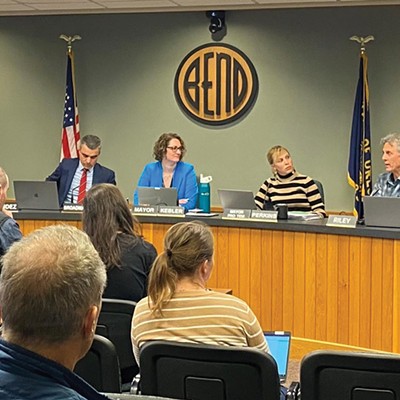It's time to find the money—and that doesn't mean yet another bond
During the past election season, several City Council candidates ran on a platform that the financial woes the City of Bend faces (potholes, general road improvements, support for septic-to-sewer transitions, a new Urban Growth Boundary) could be solved through more judicious spending. The mantra was, "The City didn't have a revenue problem, it had a spending problem."
After a harsh winter, at least one of the areas of the budget—the Bend Streets Department's winter operations budget—has been more heavily utilized than expected. The Council has indicated support for prioritizing the Streets Department with discretionary funds—but those funds will eventually run out. On top of winter operations, there are the continuing challenges of improving the pavement conditions of many streets.
Will the "spending problem" that eager City Council candidates decried actually be resolved? Has that hidden pot of money now been uncovered? Let's not hold our collective breath. Like most Oregon cities that labor without a sales tax, Bend does have a revenue problem.
There are numerous remedies to a revenue problem. One remedy—already being proposed by Bend-La Pine Schools in the upcoming May election—is to ask taxpayers to pitch in through a local bond. Bonds, of course, are financed through an addition to homeowners' property tax bills. In the case of the Bend-La Pine Schools bond, the amount proposed would be 44 cents per $1,000 of taxable value of the home. For a home with a taxable value of $200,000, that amounts to $7 per month, according to the district website.
It's not a lot—and the school bond is necessary—but those monies can add up when compounded by another bond levied by the City. Bonds have a bigger impact on people's fixed expenses. In the case of the homeowner who rents his or her home to someone else, that could mean an increase in rents that are already too high for many in our community to sustain. What this community does not need is added pressure on property owners to raise rents. We support a school bond, but we would struggle to endorse yet another bond from a different government entity at this time.
What we hope to see is a revenue stream based on consumption—paid for at least in part by the hundreds of thousands of tourists who use our roads each year. A proposed gas tax was shut down by voters in Deschutes County last May, but today, as candidates become councilors, it should be even more apparent that it's what the City needs in order to continue to move forward and provide critical services. Compared to passing the burden only onto property owners—and their stricken renters—it's simply more equitable, and we venture to say it may even get local people out of their cars a bit more often. Our region is booming with tourists, and it's high time they, too, contribute to maintaining our public resources.























